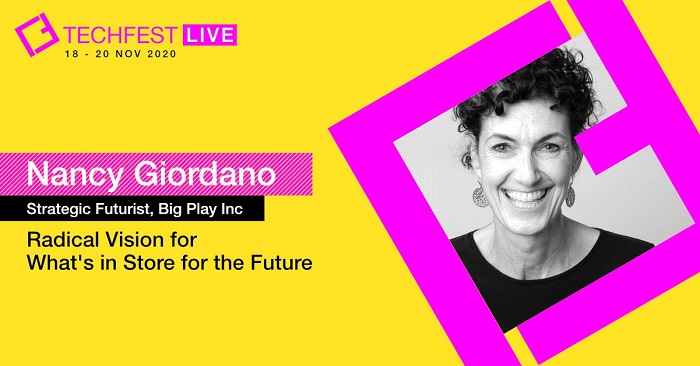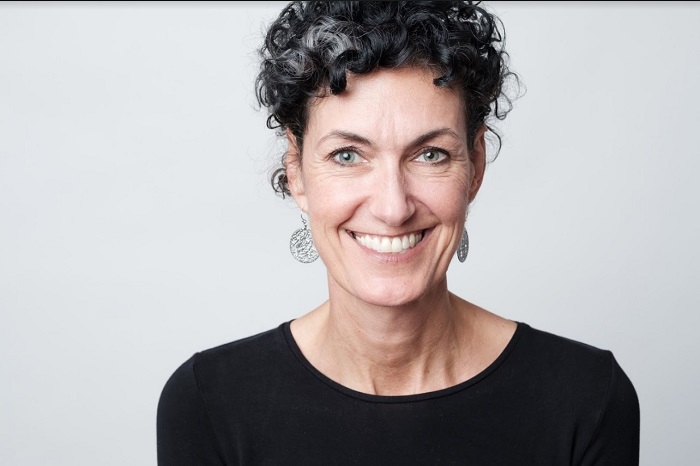TECHFEST Live 2020: Thriving in the future requires a mindset driven by dynamism, openness and inclusivity
By Tan Jee Yee November 18, 2020
- Curiousity should be inculcated individually and structurally
- Uncommon partnerships, embracing change helps navigate the unknown

Looking towards the future isn’t an easy task, especially when we’re living in such uncertain times, what with the Covid-19 pandemic set to massively alter the way we live, work and exist in the foreseeable future. For most of us, denial and fear would top our sentiments for what lies ahead.
For futurist Nancy Giordano, however, we should certainly look forwards with optimism. “We have a once in a generation opportunity to cleanly reshape how so many institutions, and how so many experiences, work,” she says.
Nancy, the Strategic Futurist of Big Play Inc, was speaking, earlier today, as part of a virtual Q&A session in TECHFEST Live 2020, interviewed by WCIT2020 CEO Low Ngai Yuen. In the session, “Radical Vision for What's in Store for the Future,” Nancy says that people today are too reliant on a “very 20th century way of navigating and creating” – methods that are not working in the 21st century.
“It’s not fast enough, not collaborative or adaptive enough. It was designed for a very different purpose, for a very industrial era.” This, she posits, is why a lot of people are feeling unprepared for the future.
For Nancy, a lot of practices or tactical structures put in place in the 20th century to mitigate risk are now, instead, creating risk. What she’s working on is essentially helping people understand that the idea of being centralised and insular, as well as only taking incremental steps rather than big, audacious steps, is making businesses more vulnerable for disruption.
A different approach, she opines, is to shift from a “leadership” mindset – where things are structured, hierarchical and closed – into what she coins as “leadering” – a mindset driven by dynamism, openness and inclusivity. “If we can shift our mindset, I think we’ll have a lot more confidence moving forward.” (Leadering is also the title of Giordano’s upcoming Jan 2021 book about the ways visionary leaders thrive.)
 Into the unknown
Into the unknown
Giordano (pic) says that this shift in mindset is akin to moving from using a worn, outdated map to navigate unknown territory into utilising a compass and referring to the North Star. “There is a way to navigate an unknown territory. It just requires different sets of tools.”
One of such tool is “curiousity”. Or, rather, a penchant for curiousity, which has to be inculcated individually as well as building organisational structures that incentivise the trait. This is implemented multiple ways, from allowing time for employees to learn that is not added onto their work, to having leaders that anticipate learning and don’t shut down curiousity.
Another tool, according Nancy, is uncommon partnerships. This isn’t just collaboration between organisations with their “go-to person”, but even among competitors – a mindset Giordano terms as being “retail competitors, but innovation collaborators.”
She points towards the many industry competitors working together for common good, such as Apple and Google working together developing Covid-19 contact tracing technology, or the various pharmaceutical companies sharing resources on creating a vaccine.
“It’s about realising all kinds of ways we can support, and share learning and resources that helps navigate something unknown so that it becomes much less riskier.”
Productivity revolution
Nancy, who is a “strategic futurist”, by which she is less about predicting the future but rather about helping people shape, build and prepare for what’s to come, says that artificial intelligence (AI) will be transformative in the near future.
“Those that understand and really get AI are going to zoom out and realise it’s going to have such an impact on business.” She hopes, however, that the impact will be good, as there are still many aspects of AI – from ethics to application and bias – that needs to be navigated responsibly.
Beyond that, things that excite Giordano includes trends that feel tangible in results, which includes precision medicine, increasing personalisation of everything from shopping to education, and vertical farming.
For Nancy, the world is not headed into the Fourth Industrial Revolution, but rather towards the first “Productivity Revolution”, where we have to think about productivity differently and how we distribute it.
“It has cascading implications on how we work, where we have to rethink about a whole bunch of social and cultural structures,” she says, such as shifts in five-day work weeks, or how the context of work will change from seeking income to self-expression.
As for what is slowing down such advancements, Nancy points towards fear as a factor. “When people fear, they make poor decisions. We’d think of the simplest solutions instead of the ones with more complexity.”
Incumbent businesses, such as fossil fuel, are the ones being threatened most by change. “Incumbent industries will work hard to slow this down, because they are not adapting enough with technology, but feel threatened by them. Those that can embrace change will become part of the acceleration of change.”
Related Stories :


